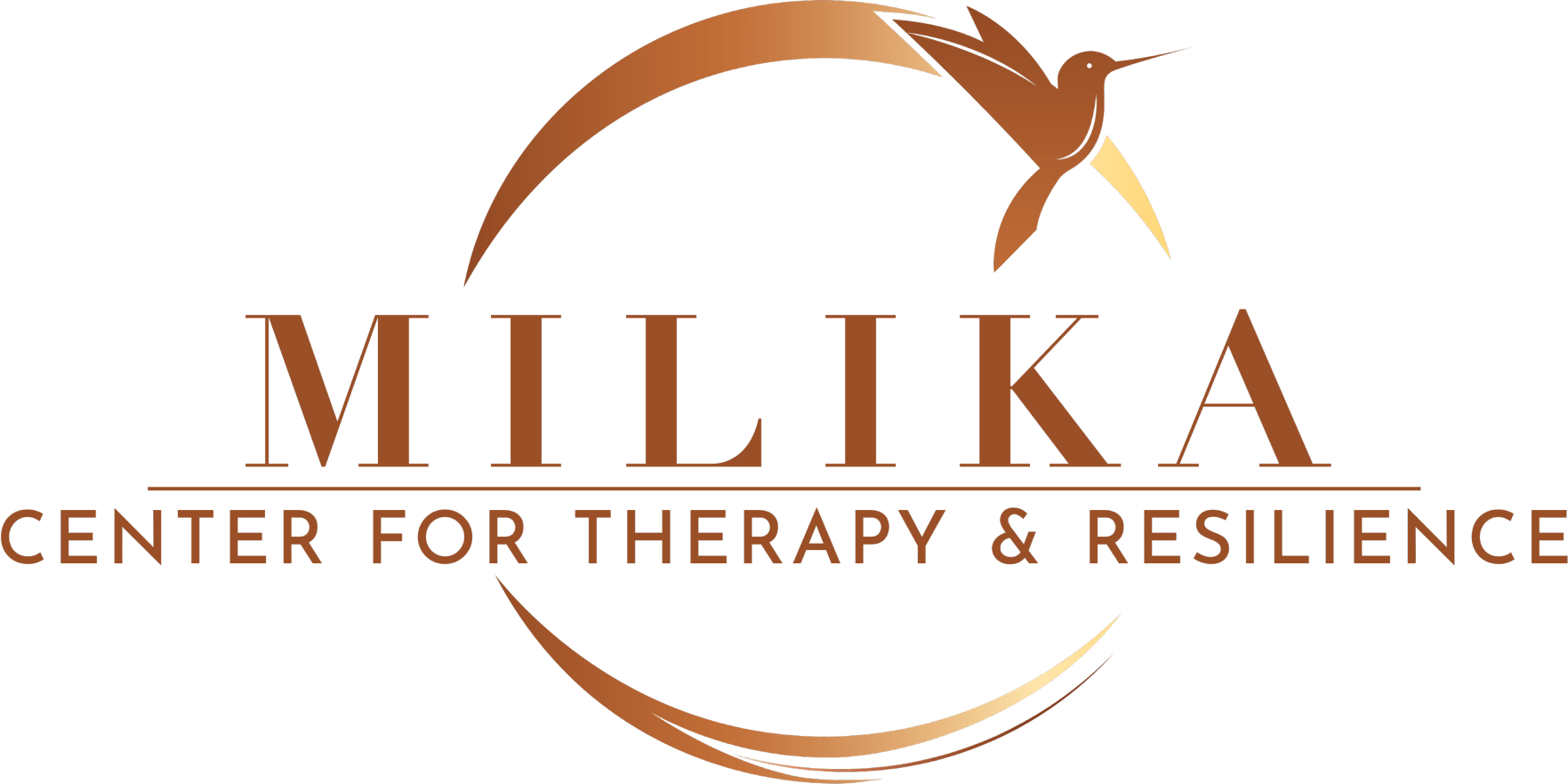MILIKA CENTER FOR THERAPY & RESILIENCE
Trauma (PTSD) Therapy
Nurturing support to help you restore balance, heal wounds, and cultivate lasting inner peace.
In-office trauma therapy sessions in Encino, Brentwood, CA and online across California.

Announcement:
Support for Los Angeles Wildfire-Affected Communities

#LAstrong
Common Types of Traumas Treated at MILIKA
Emotional or Psychological Trauma
Emotional trauma refers to experiences that cause intense psychological distress or emotional pain. This can include events like the sudden loss of a loved one, betrayal, abandonment, or severe bullying. Emotional trauma can impact a person's sense of self, relationships, and overall mental health.
Physical Trauma
This involves direct bodily harm or injury, such as accidents, assaults, physical abuse, or combat-related injuries.
Medical Trauma
Patients who get a medical diagnosis, undergo traumatic medical procedures, such as major surgeries, intensive care treatment, or life-threatening illnesses, can develop PTSD due to the stress and fear associated with these experiences.
Accidents
Being involved in or witnessing serious accidents, such as car crashes, bicycle or train-related accidents, can lead to PTSD due to the trauma and potential life-threatening circumstances involved.
Natural Disasters
Individuals who survive or witness natural disasters like earthquakes, hurricanes, floods, tsunamis, or wildfires may develop PTSD due to the sudden and overwhelming nature of the event.
Vicarious Trauma
Vicarious trauma can occur when individuals are indirectly exposed to traumatic experiences through their work or relationships with others who have experienced trauma. It can affect caregivers, therapists, first responders, journalists, and others who regularly encounter traumatic stories or experiences. It is also sometimes referred to as secondary traumatic stress.
What are Symptoms of PTSD?
Post-Traumatic Stress Disorder (PTSD) can manifest in various ways, impacting both the mind and body. Not everyone who experiences a traumatic event will develop PTSD, and the severity and duration of symptoms can differ from person to person. Common symptoms of PTSD include:
Flashbacks and Intrusive Memories
Vivid and distressing recollections of the traumatic event that can feel as though the trauma is happening again.
Negative Changes in Thinking and Mood
Persistent negative beliefs about oneself or the world, feeling detached or estranged from others, and having a decreased interest in activities previously enjoyed.
Nightmares
Repeated and distressing dreams related to the traumatic event, often leading to sleep problems and increased anxiety.
Hypervigilance
Feeling constantly on edge, easily startled, and being very vigilant for potential threats or danger.
Avoidance
Avoiding reminders of the traumatic event, including places, people, activities, or thoughts that bring up difficult memories.
Emotional Numbing
Feeling emotionally numb, detached, or unable to experience positive emotions, often as a way to cope with overwhelming feelings.
- Therapy for PTSD in Los Angeles-
How Can Therapy Help With Trauma?
Experiencing traumas can significantly impact an individual's mental, physical, social, emotional, and/or spiritual health over time. However, it's important to recognize that trauma doesn't define your entire story. Through intentional, healing-centered approaches and understanding, we can support you in not only coping with symptoms but also in building resilience and leading a fulfilling life.
Processing Traumatic Memories
Therapists use evidence-based techniques such as Cognitive Processing Therapy (CPT) or Eye Movement Desensitization and Reprocessing (EMDR) to help individuals process traumatic memories, reducing their emotional intensity and power.
Challenging Negative Beliefs
Therapy helps individuals identify and challenge negative beliefs about themselves, others, and the world that may have developed as a result of the trauma, fostering more balanced and realistic thinking patterns.
Learning Coping Skills
Therapists teach practical coping skills such as relaxation techniques, mindfulness exercises, and stress management strategies to help individuals regulate their emotions and cope with distressing symptoms.
Building Support Networks
Therapy provides a supportive and validating environment where individuals can share their experiences, connect with others who understand, and build a supportive network of friends, family, or peers.
Promoting Resilience
Therapy empowers individuals to build resilience and develop a sense of mastery over their symptoms, helping them regain a sense of control and confidence in their ability to cope with challenges.

- Therapy for PTSD in Los Angeles-
What is Post-Traumatic Growth?
Post-traumatic growth refers to the positive psychological changes that individuals may experience as a result of struggling with and ultimately coping with adversity or trauma. Post-traumatic growth is like finding a silver lining in a dark cloud.
Post-traumatic growth is not about denying the pain or suffering caused by trauma, but rather recognizing that individuals can find meaning, strength, and growth in the face of adversity.
Post-Traumatic Growth Can Include Several Domains Of Positive Change
Greater Appreciation of Life
Many individuals who have experienced trauma report a heightened appreciation for life and a deeper sense of gratitude for the present moment. They may develop a newfound awareness of the preciousness of life and a greater capacity to savor everyday experiences.
Spiritual or Existential Growth
Some individuals find that trauma prompts them to re-evaluate their priorities, values, and beliefs, leading to spiritual or existential growth. They may experience a deepening of their spiritual beliefs, a renewed sense of purpose, or a greater alignment with their core values.
Enhanced Personal Strength
Trauma survivors often discover inner reservoirs of strength, resilience, and courage that they may not have realized they possessed. They may develop a stronger sense of self-confidence, self-efficacy, and belief in their ability to overcome adversity.
Personal Growth and Development
Trauma survivors may experience personal growth in various areas of their lives, such as increased resilience, adaptability, and problem-solving skills. They may develop a greater sense of purpose, direction, and clarity about their goals and aspirations.
Deeper Relationships
Trauma can foster deeper connections and intimacy in relationships, as individuals lean on loved ones for support and comfort. Many trauma survivors report a strengthened sense of empathy, compassion, and connection with others who have experienced similar challenges.
- PTSD Treatment in Los Angeles-
What are Evidence-Based Therapies for PTSD
At the Milika Center for Therapy & Resilience, we offer evidence-based therapies specifically crafted to promote healing and cultivate resilience. We're here to guide you through the challenges of trauma and PTSD, supporting you as you rebuild and fortify your inner strength and resilience.
Trauma-Focused Cognitive-Behavioral Therapy (TF-CBT)
Explore and challenge negative thoughts and behaviors, develop coping skills, and regain a sense of control over your life.
Eye Movement Desensitization and Reprocessing (EMDR)
Process traumatic memories and experiences to reduce distress and promote healing.
Mindfulness-Based Therapies
Cultivate present-moment awareness and self-compassion to reduce stress and enhance resilience.
Trauma-Informed Yoga and Bodywork
Harness the healing power of movement and mindfulness to release tension and promote relaxation.
![[Editable version] Copy of Kanchi Wijesekera_90 Minute Wireframe (2) [Editable version] Copy of Kanchi Wijesekera_90 Minute Wireframe (2)](https://www.milikacenterfortherapyandresilience.com///wp-content/uploads/2024/05/Editable-version-Copy-of-Kanchi-Wijesekera_90-Minute-Wireframe-2.png)
ABOUT US
Why Work With Milika Center For Therapy & Resilience
Here at Milika Center for Therapy & Resilience, we understand that seeking help for mental health concerns is a courageous and transformative step.
Whether you're facing stress, anxiety, depression, significant life changes, or are on a quest for personal growth, know that you are not alone. Our team is here to offer support and expert guidance every step of the way. Together, we can work towards building unshakable resilience, fostering self-awareness, and unlocking the potential for positive change.
As the MILIKA Founder and Clinical Director, I am committed to fostering a safe and nurturing environment where individuals can embark on their journey towards healing and personal growth.
Thank you for choosing us as your partner in your mental wellness journey. We are so honored and excited to be here for you and help you unleash your inner resilience!
Warmest Regards,
Dr. Kanchi
Meet The Team

Clinical Director
Kanchi Wijesekera, Ph.D.

Clinical Psychologist
Venus Mirbod, Psy.D.

Care Coordinator
Hailee Strong, M.A.

Yoga Instructor
Laily Gallo
You Deserve Healing
It's important to know that PTSD is treatable, and you don't have to face it alone. Therapy can provide you with the tools and support you need to navigate through your symptoms and reclaim control over your life.
If you're ready to take the first step towards healing from PTSD, we're here to support you.
Contact us today to schedule a FREE 20-minute confidential consultation and begin your journey towards a brighter tomorrow.
Ready to get started?
Ready to get started? Start your journey towards resilience and mental well-being today by contacting us to schedule a consultation.


